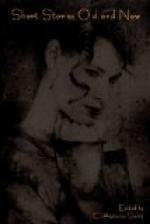The accordion and the bones were put aside that day, and Homer was forgotten. When the body of Mother Shipton had been committed to the snow, Mr. Oakhurst took the Innocent aside, and showed him a pair of snow-shoes, which he had fashioned from the old pack-saddle. “There’s one chance in a hundred to save her yet,” he said, pointing to Piney; “but it’s there,” he added, pointing towards Poker Flat. “If you can reach there in two days she’s safe.” “And you?” asked Tom Simson. “I’ll stay here,” was the curt reply.
The lovers parted with a long embrace. “You are not going, too?” said the Duchess, as she saw Mr. Oakhurst apparently waiting to accompany him. “As far as the canon,” he replied. He turned suddenly, and kissed the Duchess, leaving her pallid face aflame, and her trembling lips rigid with amazement.
Night came, but not Mr. Oakhurst. It brought the storm again and the whirling snow. Then the Duchess, feeding the fire, found that some one had quietly piled beside the hut enough fuel to last a few days longer. The tears rose to her eyes, but she hid them from Piney.
The women slept but little. In the morning, looking into each other’s faces, they read their fate. Neither spoke; but Piney, accepting the position of the stronger, drew near and placed her arm around the Duchess’s waist. They kept this attitude for the rest of the day. That night the storm reached its greatest fury, and, rending asunder the protecting pines, invaded the very hut.
Toward morning they found themselves unable to feed the fire, which gradually died away. As the embers slowly blackened, the Duchess crept closer to Piney, and broke the silence of many hours: “Piney, can you pray?” “No, dear,” said Piney, simply. The Duchess, without knowing exactly why, felt relieved, and, putting her head upon Piney’s shoulder, spoke no more. And so reclining, the younger and purer pillowing the head of her soiled sister upon her virgin breast, they fell asleep.
The wind lulled as if it feared to waken them. Feathery drifts of snow, shaken from the long pine-boughs, flew like white-winged birds, and settled about them as they slept. The moon through the rifted clouds looked down upon what had been the camp. But all human stain, all trace of earthly travail, was hidden beneath the spotless mantle mercifully flung from above.
They slept all that day and the next, nor did they waken when voices and footsteps broke the silence of the camp. And when pitying fingers brushed the snow from their wan faces, you could scarcely have told from the equal peace that dwelt upon them, which was she that had sinned. Even the law of Poker Flat recognized this, and turned away, leaving them still locked in each other’s arms.
But at the head of the gulch, on one of the largest pine-trees, they found the deuce of clubs pinned to the bark with a bowie-knife. It bore the following, written in pencil, in a firm hand:—




